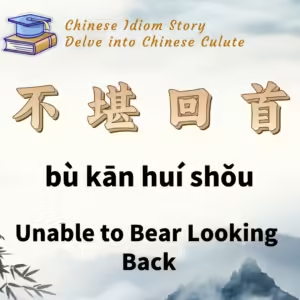
Chinese Idiom: 不堪回首 (Bu Kan Hui Shou)
English Translations: Unable to Bear Looking Back
pīn yīn: bù kān huí shǒu
Idiom Meaning: This idiom is used to describe something that is too painful or distressing to revisit. It refers to unpleasant memories or experiences that one prefers to avoid recalling.
Historical Source: ü Mei Ren (《虞美人》) by Li Yu (李煜)
Idiom Story:
Li Yu, the last ruler of the Southern Tang, was captured and imprisoned in Bianjing (modern-day Kaifeng) after his kingdom fell to the Song Dynasty. On July 7, 978, which happened to be Li Yu’s birthday, he was deeply distressed. The previous Song Emperor Zhao Kuangyin had died, and his brother Zhao Guangyi had succeeded him. Zhao Guangyi was wary of Li Yu and kept him under close surveillance, adding to Li Yu’s misery.
On his birthday, Li Yu found himself reminiscing about the grandeur of his past life in Southern Tang, marked by celebrations and high status. Now, imprisoned and in a different place, he was overwhelmed by sadness. He asked a singer from Southern Tang to perform his new work, Yü Mei Ren (虞美人). The song, filled with nostalgia and sorrow, was as follows:
Spring flowers and autumn moons, when will they end? How many past events do I remember? The little building last night, with the east wind blowing, reminds me of my homeland, which I can barely bear to recall under the bright moon.
The carved balustrades and jade steps should still be there, but only the face has changed. How much sorrow can one have? It is just like the endless flow of spring river water.
Li Yu’s poignant lament, “故国不堪回首月明中” (gù guó bù kān huí shǒu yuè míng zhōng), meaning “my fallen country is too painful to recall under the bright moon,” later gave rise to the idiom “不堪回首” (bù kān huí shǒu).
Upon hearing the discontent in Li Yu’s lyrics, Zhao Guangyi became furious and ordered Li Yu’s execution. Li Yu was forced to commit suicide by poison the following day, dying at the age of 42.
The idiom “不堪回首” thus evolved from Li Yu’s expression of unbearable sorrow and nostalgia for his lost kingdom.






